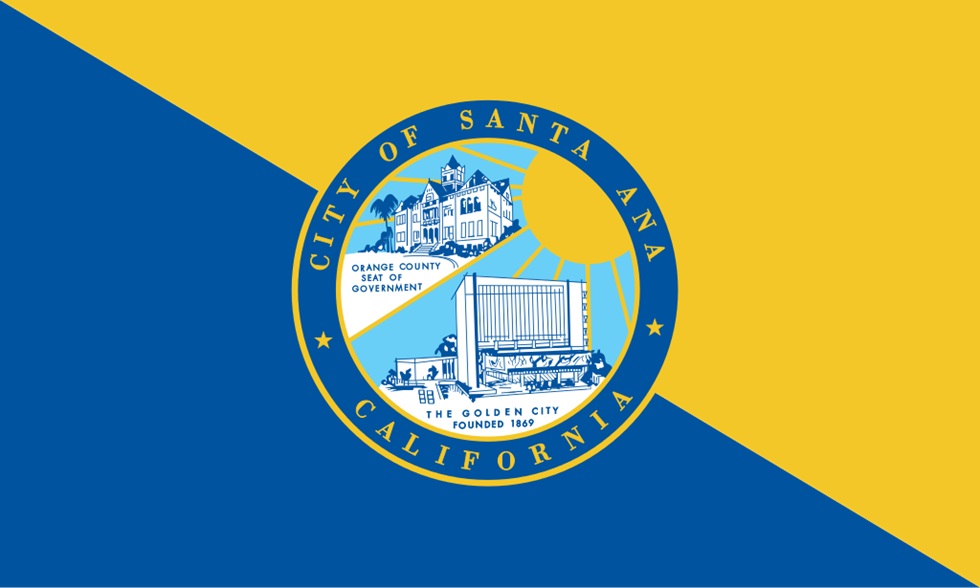
SANTA ANA, Calif. — Santa Ana Families for Fair Elections (SAFFE), a multi-racial coalition of community organizations and residents in Santa Ana, Calif., are organizing to win voting rights for all local residents, regardless of their immigration status. The campaign aims to enfranchise the nearly one out of every four residents who are noncitizens and currently excluded from voting in local elections.
The coalition successfully won city council approval to place an initiative on the November ballot to ask residents if the city should allow noncitizen voting. If approved, Santa Ana would become the first city in California to allow noncitizens to vote in city council elections.
Santa Ana is home to the largest share of noncitizens in Orange County. Out of the city’s estimated 313,818 residents, 74,125 (23.62%) are noncitizens who currently do not have the right to vote in city council elections. At the heart of this campaign lies the principle of democratic inclusion, which states that every resident’s voice should be heard in decisions that significantly impact their daily lives.
When debating the proposal to place the initiative on the November ballot, Councilman Ben Vazquez said, “I am interested in exploring what we can do to expand and strengthen democracy at the local level. Right now, a huge portion of our residents are subject to the policies we decide on but can’t make their voices heard in local elections. That’s undemocratic and unfair.”
Maria de Los Angeles Piña, an immigrant resident of Santa Ana for 20 years and SAFFE member, says, “City funding and resources are allocated based on political representation. We live in a city where the majority of residents are renters, and many of them are immigrants and refugees that cannot vote. We need political representation that reflects us. We must have the right to vote to have our voices represented.”
Carlos Perea, executive director of the Harbor Institute for Immigrant & Economic Justice, said, “It is undemocratic to exclude a large number of residents living in the city from voting in local elections. We must close the gap between those who govern and the governed.”
Phuong Vu, a Vietnamese senior resident of Santa Ana for 27 years, says, “The city needs to expand the right to vote for all residents regardless of immigration status. As immigrants, we also contribute to the city. This will only strengthen our city and showcase freedom and equality. It will help uplift the spirit of the Vietnamese community in Santa Ana and improve our living conditions. I urge the City Council to help us pass noncitizen voting to improve Santa Ana for everyone.”
The initiative voters will decide reads: “Shall the city of Santa Ana City Charter be amended to allow, by the November 2028 general municipal election, non-citizen city residents, including those who are taxpayers and parents, to vote in all city of Santa Ana municipal elections.”
If the initiative passes in November, it will begin a multi-year effort before noncitizens can vote because the Orange County Registrar, which manages Santa Ana elections, would need to set up a process to accommodate noncitizen voting.

The City of San Francisco passed a similar initiative, allowing noncitizens to vote in local school board elections. When legally challenged on constitutional grounds by the conservative group United States Justice Foundation, the court of appeals ruled that it does not violate the California Constitution. However, the USJF has vowed to sue in federal court any other city that approves voting rights to noncitizens.
The Immigration Reform Act and Immigrant Responsibility Act of 1996 prohibit noncitizens from voting in federal elections. It also states that noncitizens can vote if they are “authorized to vote for such other purposes under a state constitution or statute or local ordinance.”
On the issue of noncitizen voting, San Francisco State University political science professor Ron Hayduk has said, “While [noncitizens] live under the same policies set by legislative bodies, they have little ability to influence and select the representatives making those laws. This exclusion is a fundamental violation of their self-determination—an affront to one of their most basic, inviolable rights.”
Hayduk continues, “Although hardly homogeneous, immigrants as a group tend to score low on many social indicators of wellbeing, including income, poverty, hunger, and education. Such outcomes are the result, at least in part, of political disenfranchisement. Politicians can enact discriminatory public policy and private practices—in employment, housing, education, health care, welfare, and criminal justice—and run xenophobic campaigns, secure in the knowledge that non-citizens won’t be able to punish them at the polls.”
Notably, noncitizen voting was widespread in the U.S. at the beginning of the nation’s history; it ended only in the 1920s. It is permitted in 45 countries worldwide in local or regional elections and sometimes at the national level.
“Noncitizen voting in federal elections was barred in 1996, but where it’s been allowed in the U.S. in recent years—in 11 towns in Maryland as well as San Francisco, two cities in Vermont, and a few other jurisdictions—the sky hasn’t fallen. In many cases, it has led to greater political engagement and often to improved outcomes,” says Hayduk.
Further information about Santa Ana Families for Fair Elections, including ways people can help with the campaign, can be found here.
We hope you appreciated this article. At People’s World, we believe news and information should be free and accessible to all, but we need your help. Our journalism is free of corporate influence and paywalls because we are totally reader-supported. Only you, our readers and supporters, make this possible. If you enjoy reading People’s World and the stories we bring you, please support our work by donating or becoming a monthly sustainer today. Thank you!












Comments